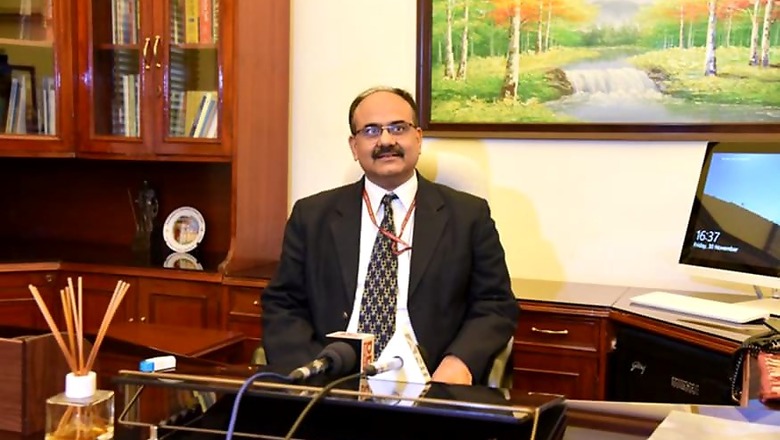
views
New Delhi: The new lower income tax rates offered in the Budget 2020-21 will leave more cash in the hands of those who do not wish to make compulsory investments to save tax, said Revenue Secretary Ajay Bhushan Pandey.
In an interview with PTI, he said the Budget gives an option to individuals to migrate to a new regime by foregoing their existing exemptions and deductions for a lower tax rate.
"We are not saying which one is beneficial, which one is not beneficial. We have provided an option. We have not put restrictions on anyone. This proposal can only benefit somebody and not harm anybody," he said. "So, in this whole proposal, not a single person will be loser."
He said taxpayers have an option to stay with the current regime of getting a standard deduction of Rs 50,000 and investing Rs 1.5 lakh in saving schemes and pay 5 per cent, 10 per cent or 30 per cent tax depending on income levels.
Alternatively, they can migrate to the new regime and pay lower tax rates without having to invest in any instrument to claim exemption, he said.
In the new regime, 5 per cent tax is levied on an annual income between Rs 2.5 lakh and Rs 5 per cent. The tax rate rises to 10 per cent, 15, per cent, 20 per cent and 25 per cent for every Rs 2.5 lakh addition. A 30 per cent tax is charged for income over Rs 15 lakh.
"Because the proposal is that we will continue the old scheme and if you find the new scheme attractive, you come or else you don't come. Therefore, there is no scope of confusion or worry," he said.
Pandey said the taxpayer will have to choose between old and the new regime at the time of filing return for the next financial year, sometime in July 2021.
"When you file I-T return, there will be a choice. If you say choice 1 then the return form in the new system will open and most of your application will be pre-filled. Then, you make appropriate changes and file I-T (return). If you choose the old system, then only that form will open. It is easier to pre-fill the form under new tax structures," he said.
He said data show that out of the 5.8 crore individuals who filed income tax returns in the financial year 2018-19, 90 per cent claimed tax deductions of less than Rs 2 lakh, including deductions under Section 80C of the Income Tax Act (for provident fund, PPF, life insurance premium), Section 80D (mediclaim insurance), Section 80CCD(1B) (additional deduction for National Pension Scheme), deduction for housing loan interest and standard deduction.
"I am not saying it (new scheme) will benefit everyone. It might benefit 30-40 per cent people. But, even if it is benefiting 30 per cent people then also it is a big thing," he said. "We are giving option to those people who are unable to avail exemptions or deductions. Who are these people -- somebody who has just joined job market, someone who has not decided to buy a house, he does not know how much will be savings, he might be putting little money in PF (provident fund) and insurance. He may find that depending on his income, this new scheme is better."
Similarly, for senior citizens living on a pension and who do not have to buy a house or put money in PF, the new regime would be beneficial, he said.
The new tax regime is also beneficial for small businessmen and shopkeepers who do not get the benefit of LTC or HRA.
"It is not that our objective was to provide benefit to each and every section of the taxpayer. We have provided option and that should be fine," he said adding the new tax rates would lead to a Rs 40,000 crore dent in government revenues in the next financial year.
Individuals having an annual salary income of over Rs 13 lakh and availing deductions of up to Rs 2 lakh will save on their tax outgo if they opt for the new tax regime proposed in the Budget, government sources said on Sunday.
For those earning a salary of Rs 12 lakh and less and availing deductions of up to Rs 2 lakh, the old tax system will be beneficial as the tax outgo will be less compared to the proposed new structure.
While individuals with an annual salary income of Rs 13 lakh and above will pay Rs 1.43 lakh tax under the proposed tax structure; in the old regime, they would have paid a tax of Rs 1.48 lakh, thereby saving Rs 5,200, a source said.
On a salary of Rs 14 lakh a year, savings would be Rs 10,400; and for those with an income of Rs 15 lakh and above, savings would be Rs 15,600, provided the deductions claimed are up to Rs 2 lakh.
In the case of non-salary earners, who do not get a standard deduction of Rs 50,000, the new tax structure is beneficial for those earning Rs 9.5 lakh annually and availing deductions up to Rs 1.5 lakh. They would save Rs 5,200 in their annual income tax outgoing.




















Comments
0 comment